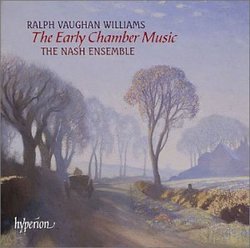| All Artists: Vaughan Williams, Nash Ensemble Title: Early Chamber Music Members Wishing: 1 Total Copies: 0 Label: Hyperion UK Release Date: 12/10/2002 Album Type: Import Genre: Classical Styles: Chamber Music, Historical Periods, Classical (c.1770-1830) Number of Discs: 2 SwapaCD Credits: 2 UPC: 034571173818 |
Search - Vaughan Williams, Nash Ensemble :: Early Chamber Music
CD Details |
CD ReviewsNearly 2 hours of previously unknown Vaughan Williams Rodney Gavin Bullock | Winchester, Hampshire Angleterre | 03/29/2004 (5 out of 5 stars) "The last year or so have been good ones for lovers of Vaughan Williams' music, with the release of the original version of his A London Symphony, the full score of the Scott of the Antarctic film music and now this double CD with three major and a number of smaller early chamber works. The works are: string quartet in C minor (1898); quintet for clarinet, horn, violin, cello & piano (1898); piano quintet (1903); scherzo for string quintet (1904); nocturne & scherzo (1906); romance (1914); romance and pastorale (1914); suite de ballet (1913-24); three preludes on Welsh Hymn Tunes (for string quartet)(1940/41).As can be seen, they are are not all early but, with the exception of the preludes, are works that the composer withheld. Ursula Vaughan Williams, in consultation with the leading authority on the composer, Michael Kennedy, felt they should be released, both for their intrinsic quality and for the light they shed on RVW's musical development. There are nearly two hours of "new" music and the Three Preludes have not been recorded in the string quartet version before.The first thing these discs reveal is how confidently RVW was writing at the age of 26. He handles the piano with a deftness which gives the lie to later jibes about his inability to write properly for this instrument. He was quite at home with the string quartet as well. All three of the large scale works are very early yet he is plainly the master of large paragraphs and forms, creating totally convincing structures running to 30 minutes or so. But they do not sound like mature Vaughan Williams. The piano quintet starts with a rhythmic call to attention, followed by a strong first subject on the strings accompanied by running piano figurations strongly reminiscent of Fauré. The string quartet begins with echoes of Dvorak, but the lasting influence is that of Brahms. The melodies are well defined and memorable. Occasionally the music becomes modal and these passages seem to take the music forward ten years. All in all, these are enjoyable works and when you get to know them, they become more than just juvenelia and are good enough to be loved for themselves.The remaining pieces are small in scale, lasting from 5-10 minutes, with the exception of the Three Preludes (15 minutes). They are all enjoyable, with the later ones being in RVWs more mature style. They are not out of the composer's top drawer, however.Some have portrayed Vaughan Williams as an barely competent amateur who hardly knew a diminished seventh from a Neopolitan sixth. This release shows he was a master of technique from an early stage. What took time was to break free from German models to create his unique style based on the music of his own country.
In a number of these pieces, you can hear the seeds trying to germinate.The performances of the Nash Ensemble are excellent as is the Hyperion recording. The insert notes are by Michael Kennedy, who was a friend of the composer and is a leading expert on his music." |

